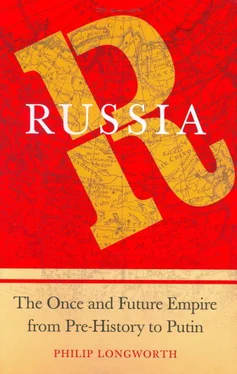The eventual Soviet assault was heralded by salvos of rockets. Then 3,500 guns and mortars roared and thundered out their bombardment along a 14-mile front. After an interval, tanks bearing sharpshooters began to trundle forward through the freezing fog. The Germans counterattacked, sending in the Romanian Third Army, which quickly met its doom. The Soviet tanks moved forward. The most convenient point for crossing the river Don was seized, and at 2 p.m. on 26 November units of the Stalingrad front joined up with tanks of South-Western Command to surround between 80,000 and 90,000 men of the German Sixth Army under Friedrich von Paulus. He thought of breaking out. Hitler ordered him to stay firm. In the end he was forced to surrender.
By the end of January 1943 it was clear that the invader’s southern front had been shattered and preparations went forward for an offensive to break its backbone. The triumph at Stalingrad had given a huge fillip to morale, and the fresh troops rushed up to front-line positions were no longer merely dour and determined but eager for battle. The elation, however, led to overconfidence on Stalin’s part. Rather than concentrating resources on the achievement of one objective and against one of the three enemy army groups, he ordered a series of offensives along the entire front. 43
This onslaught, which began in late January and early February, was overambitious and soon ground to a halt. The Germans regained some territory; the scales of war tipped one way, then the other, until eventually a state of equilibrium was reached. In August the city of Kharkov was finally retaken, and then a battle which was to take its name from the Kursk salient began to take shape. It covered a vast area of the steppe, lasted from August to the beginning of October, involved multiple armies, and was directed on the Soviet side by Zhukov and on the German by Field Marshal von Manstein. It is regarded by some specialists as the decisive battle of the Second World War, and it ended in complete Soviet victory. The German general staff itself concluded that from that point on Soviet Russia would surpass Germany in the mobilization of men and the production of equipment, and in the field of propaganda. 44It was not long before yet another mass offensive was started and Soviet troops were crossing the Dnieper and racing towards the western frontier. The tide of war had changed decisively.
This awesome result, which had seemed so unlikely less than two years earlier, was the product of many factors. Chief, perhaps, was what Tukhachevskii had termed ‘moral fibre’ — the grit and determination not only of the Soviet forces, but of the civilian population, not least the women. But for the patience and fortitude of its people in the face of many months of bombardment and privation, the ruined city of Leningrad could not have withstood the siege; but for the unremitting efforts of workers, even in the hardest circumstances, the front-line soldiers would never have been supplied. As the danger had increased, the Soviet population — including most of the national minorities, peasant kulaks, and even victims of the purges — seemed to acquire a commitment which had not existed in the beginning. As in 1812, the war had become a genuinely patriotic struggle. The invaders, it seems, had themselves generated the antibodies which would smother them.
Yet in retrospect it also seems that the Soviet regime was aided by some strokes of good fortune. One was Japan’s refusal to co-ordinate its war plan with Germany’s. Another was Hitler’s faulty direction of strategy, especially in the case of Stalingrad. Another self-imposed handicap was his racial doctrine. Many Ukrainians had welcomed the invaders, greeting them with bread and salt. Yet Nazi racial theory classified Slavs as inferior, and barred their acceptance on equal terms as some army officers had advised. Ukraine had at first proved a good recruiting ground for the invaders, but the punitive actions taken in response to partisan activity alienated the bulk of the population who had initially seemed so well disposed.
Some Chechens joined the invaders, though some were decorated for gallantry in fighting against them. Perhaps because they had easier access to the Germans, numbers of Cossacks collaborated — and in April 1942 Hitler did sanction the formation of Cossack volunteer units. Some served in police detachments on the Don, but there were several requests to form a Cossack army to fight the Communists, and eventually the request was granted, though the Germans set their face against Cossack independence. An army major of Cossack origins who joined the Germans was allowed to form a squadron from Cossack prisoners and deserters and was employed in front-line propaganda, encouraging desertion with promises that collective farming would be abolished. And a Russian major-general, Vlasov, who had been taken prisoner, opted for the Germans. He set about recruiting an ‘All-Russian Army of Liberation’ from prisoners of war, hoping to raise a million men. Fewer than 200,000 joined him. 45It was 1943, and the tide of war had changed. Few factors are as efficient as success in shoring up loyalties.
The scale of the victory came as a surprise to the world, and even to Stalin’s allies. But once the message sank into consciousness that the neophyte, half-ruined, economically crippled Soviet Union had thrashed the hitherto invincible war machine of Europe’s strongest economic power, together with its satellites, attitudes were revolutionized. The erstwhile pariah suddenly acquired immense prestige, even legitimacy. At the same time a genuinely Soviet patriotism had emerged. Participation in the most total of total wars to date also resulted in a liberation of sorts. Realizing that the circumstance demanded compromise, Stalin restrained his ruthless security forces, for there was now a general commitment to the cause against the common enemy.
13
The High Tide of Soviet Imperialism
ALTHOUGH THEIR CAUSE was already doomed, Hitler’s armies fought on with fierce desperation for almost two years more. By the time they were overwhelmed and Hitler himself had committed suicide in the ruins of Berlin, Stalin’s armies controlled the larger part of Europe. The Soviet Union now regained all the territories it had claimed under the Nazi-Soviet Pact (though Britain and the United States would not recognize its rule in the former Baltic states as legitimate). It also acquired the ancient German city of Konigsberg, renaming it Kaliningrad. Albeit tacitly, the Western Powers also recognized the Soviet Union’s right to a sphere of influence in eastern Europe beyond its own frontiers, and with the advent of the ‘Cold War’ two years later — though not before — the construction of a new kind of Russian empire consisting of nominally independent dominions got under way.
In the Far East, the Soviet Union’s belated participation in the war with Japan enabled it to add southern Sakhalin and the Kurile Islands to its possessions. China turned Communist, and for a moment even France and Italy seemed likely to do so. Marxist internationalism proved to be a far more potent lure than pan-Slavism had ever been. Furthermore, since the Soviet regime offered both a model for overcoming backwardness and help for peoples oppressed by other imperial powers, many more countries, including Egypt, Afghanistan and Cuba, were to become Soviet clients. For a time only the Western monopoly of nuclear weapons seemed to prevent a stampede to enter Stalin’s corral, and, thanks to its espionage service, the Soviet Union soon broke that monopoly. Just as the Soviet leaders came to poach Western technology and suborn useful citizens, they learned to exploit discontent in capitalist countries and cut a dash in the Third World.
Читать дальше





![Stephan Orth - Behind Putin's Curtain - Friendships and Misadventures Inside Russia [aka Couchsurfing in Russia]](/books/415210/stephan-orth-behind-putin-s-curtain-friendships-a-thumb.webp)





